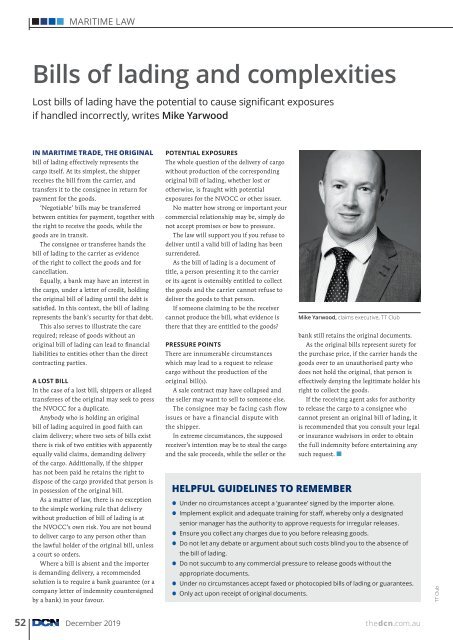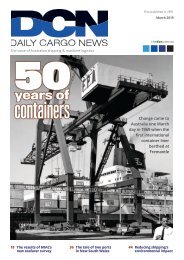DCN December Edition 2019
Create successful ePaper yourself
Turn your PDF publications into a flip-book with our unique Google optimized e-Paper software.
MARITIME LAW<br />
Bills of lading and complexities<br />
Lost bills of lading have the potential to cause significant exposures<br />
if handled incorrectly, writes Mike Yarwood<br />
IN MARITIME TRADE, THE ORIGINAL<br />
bill of lading effectively represents the<br />
cargo itself. At its simplest, the shipper<br />
receives the bill from the carrier, and<br />
transfers it to the consignee in return for<br />
payment for the goods.<br />
‘Negotiable’ bills may be transferred<br />
between entities for payment, together with<br />
the right to receive the goods, while the<br />
goods are in transit.<br />
The consignee or transferee hands the<br />
bill of lading to the carrier as evidence<br />
of the right to collect the goods and for<br />
cancellation.<br />
Equally, a bank may have an interest in<br />
the cargo, under a letter of credit, holding<br />
the original bill of lading until the debt is<br />
satisfied. In this context, the bill of lading<br />
represents the bank’s security for that debt.<br />
This also serves to illustrate the care<br />
required; release of goods without an<br />
original bill of lading can lead to financial<br />
liabilities to entities other than the direct<br />
contracting parties.<br />
A LOST BILL<br />
In the case of a lost bill, shippers or alleged<br />
transferees of the original may seek to press<br />
the NVOCC for a duplicate.<br />
Anybody who is holding an original<br />
bill of lading acquired in good faith can<br />
claim delivery; where two sets of bills exist<br />
there is risk of two entities with apparently<br />
equally valid claims, demanding delivery<br />
of the cargo. Additionally, if the shipper<br />
has not been paid he retains the right to<br />
dispose of the cargo provided that person is<br />
in possession of the original bill.<br />
As a matter of law, there is no exception<br />
to the simple working rule that delivery<br />
without production of bill of lading is at<br />
the NVOCC’s own risk. You are not bound<br />
to deliver cargo to any person other than<br />
the lawful holder of the original bill, unless<br />
a court so orders.<br />
Where a bill is absent and the importer<br />
is demanding delivery, a recommended<br />
solution is to require a bank guarantee (or a<br />
company letter of indemnity countersigned<br />
by a bank) in your favour.<br />
POTENTIAL EXPOSURES<br />
The whole question of the delivery of cargo<br />
without production of the corresponding<br />
original bill of lading, whether lost or<br />
otherwise, is fraught with potential<br />
exposures for the NVOCC or other issuer.<br />
No matter how strong or important your<br />
commercial relationship may be, simply do<br />
not accept promises or bow to pressure.<br />
The law will support you if you refuse to<br />
deliver until a valid bill of lading has been<br />
surrendered.<br />
As the bill of lading is a document of<br />
title, a person presenting it to the carrier<br />
or its agent is ostensibly entitled to collect<br />
the goods and the carrier cannot refuse to<br />
deliver the goods to that person.<br />
If someone claiming to be the receiver<br />
cannot produce the bill, what evidence is<br />
there that they are entitled to the goods?<br />
PRESSURE POINTS<br />
There are innumerable circumstances<br />
which may lead to a request to release<br />
cargo without the production of the<br />
original bill(s).<br />
A sale contract may have collapsed and<br />
the seller may want to sell to someone else.<br />
The consignee may be facing cash flow<br />
issues or have a financial dispute with<br />
the shipper.<br />
In extreme circumstances, the supposed<br />
receiver’s intention may be to steal the cargo<br />
and the sale proceeds, while the seller or the<br />
Mike Yarwood, claims executive, TT Club<br />
bank still retains the original documents.<br />
As the original bills represent surety for<br />
the purchase price, if the carrier hands the<br />
goods over to an unauthorised party who<br />
does not hold the original, that person is<br />
effectively denying the legitimate holder his<br />
right to collect the goods.<br />
If the receiving agent asks for authority<br />
to release the cargo to a consignee who<br />
cannot present an original bill of lading, it<br />
is recommended that you consult your legal<br />
or insurance wadvisors in order to obtain<br />
the full indemnity before entertaining any<br />
such request.<br />
HELPFUL GUIDELINES TO REMEMBER<br />
• Under no circumstances accept a ‘guarantee’ signed by the importer alone.<br />
• Implement explicit and adequate training for staff, whereby only a designated<br />
senior manager has the authority to approve requests for irregular releases.<br />
• Ensure you collect any charges due to you before releasing goods.<br />
• Do not let any debate or argument about such costs blind you to the absence of<br />
the bill of lading.<br />
• Do not succumb to any commercial pressure to release goods without the<br />
appropriate documents.<br />
• Under no circumstances accept faxed or photocopied bills of lading or guarantees.<br />
• Only act upon receipt of original documents.<br />
TT Club<br />
52 <strong>December</strong> <strong>2019</strong><br />
thedcn.com.au
















